
(النسخة العربية)
Results of the Fourth Edition – 2023
The State of Kuwait has maintained first rank for the fourth year, with a score of 534 out of a total of 1,000 on the GCCPPI. The State of Qatar has maintained the second rank, with a score of 472.
The Sultanate of Oman has remained in the third rank with a score of 445. The Kingdom of Bahrain remained in the fourth rank with a score of 433, followed by the United Arab Emirates in the fifth rank with a score of 320, and then the Kingdom of Saudi Arabia in the last rank with a score of 250.
It is noted that the progress of both Qatar (+19 scores) and Saudi Arabia (+17 scores) is the most prominent compared to the results of the previous year. Oman has also advanced by 6 scores, while Kuwait and the UAE have remained at the same score. Bahrain was the only state that has witnesses a decline of 5 scores.
Kuwait alone still exceeds the 500-score mark of the total index scores within the last four years, which indicates a state of stagnation in the development of political environments within the GCC countries.

The index results illustrate the need of the GCC countries to adopt clear national strategies towardsexpanding frameworks for political participation, especially strengthening and expanding the powers of elected councils, improving election laws, promoting equal citizenship and ensuring freedom of opinion and expression and the safety of individuals engaged in political work. In this context, it is noted that the rates of popular participation in the general elections witnesses by some Gulf States during the past hear have declined.
The Gulf States lack encouraging climates and safe spaces to consider public affairs issues and to discuss the promotion of political participation in those countries, especially as the powers of oversight, accountability and inquiry of the legislative or advisory authorities in the Gulf States are often prohibited or restricted. The formation of political organisations, the availability of dissenting tools and ensuring the safety of practitioners represent serious challenges in all GCC countries. With the exception of Bahrain, all Gulf States criminalise the formation of political organisations.
The percentages of members of the ruling families in the Gulf States holding senior positions in government, security and military institutions and the judiciary are high, which limits the opportunities of access for the rest of societal components to these positions.
Oman represents a unique model in promoting a climate of equal citizenship and proportional representation of its groups and minorities. On the other hand, UAE, Kuwait, Qatar and Bahrain adopt discriminatory policies and unequitable representation with regard to their citizens’ right to access to senior positions, standing and voting in general elections. These policies are based on barriers and controls defined by the laws of nationality, exercise of political rights and organisation of elections.
The results of most index measures indicate the importance of equal citizenship in the GCC countries, as some practices and laws obstruct the effective participation and proportional representation of some groups and minorities, with the “stateless people” being one of the most marginalised groups in these countries.
Women’s empowerment steps are accelerating in Saudi Arabia, while the UAE, Bahrain and Qatar are making progress in improving women’s participation and launching initiatives to enhance their opportunities in public affairs and the labour market. In contrast, steps are still slow in the Sultanate of Oman and significantly backward in Kuwait, as the representation of Kuwaiti women in the executive and legislative branches is very modest.
Despite the increasing number of civil society organisations established in the Gulf States, the powers and roles of those institutions are limited and diminished, as the laws regulating the work of those institutions impose rigorous restrictions on funding sources and activities.
Levels of community participation in independent oversight of state institutions’ performance and spending remain limited. The GCC countries also continue to provide low levels of freedom of opinion and expression, while some countries impose harsh penalties on opposing or critical opinions.
Bahrain and Oman are distinguished by ensuring stable and effective residency and guaranteeing the rights of foreign communities and expatriate workers. In addition, the rest of the countries achieved slight improvement. However, the freedom of trade union work and participation in municipal elections are still prohibited or restricted.
The results of the four editions (2020-2023) of the “Political Participation Index in the Gulf Cooperation Council Countries (GCCPPI)” reflect a continuing positive development in Qatar and Saudi Arabia, and while the results show a state of stagnation in Kuwait and the United Arab Emirates, the results for Bahrain and Oman appear to fluctuate from one year to the next.
State of Kuwait brief results
Kuwait has maintained the first rank on the GCC political participation index, with a score of 534, exceeding the 500-score barrier out of the index’s total score (1,000).
This year’s results indicate an improvement in Kuwait’s performance on the Freedom of Opinion and Expression scale (5 scores), and a decline on the Gender Equivalence and Youth Engagement scale with a loss of 7 scores. The General Elections and Political Organisations Scales witnessed a slight increase.
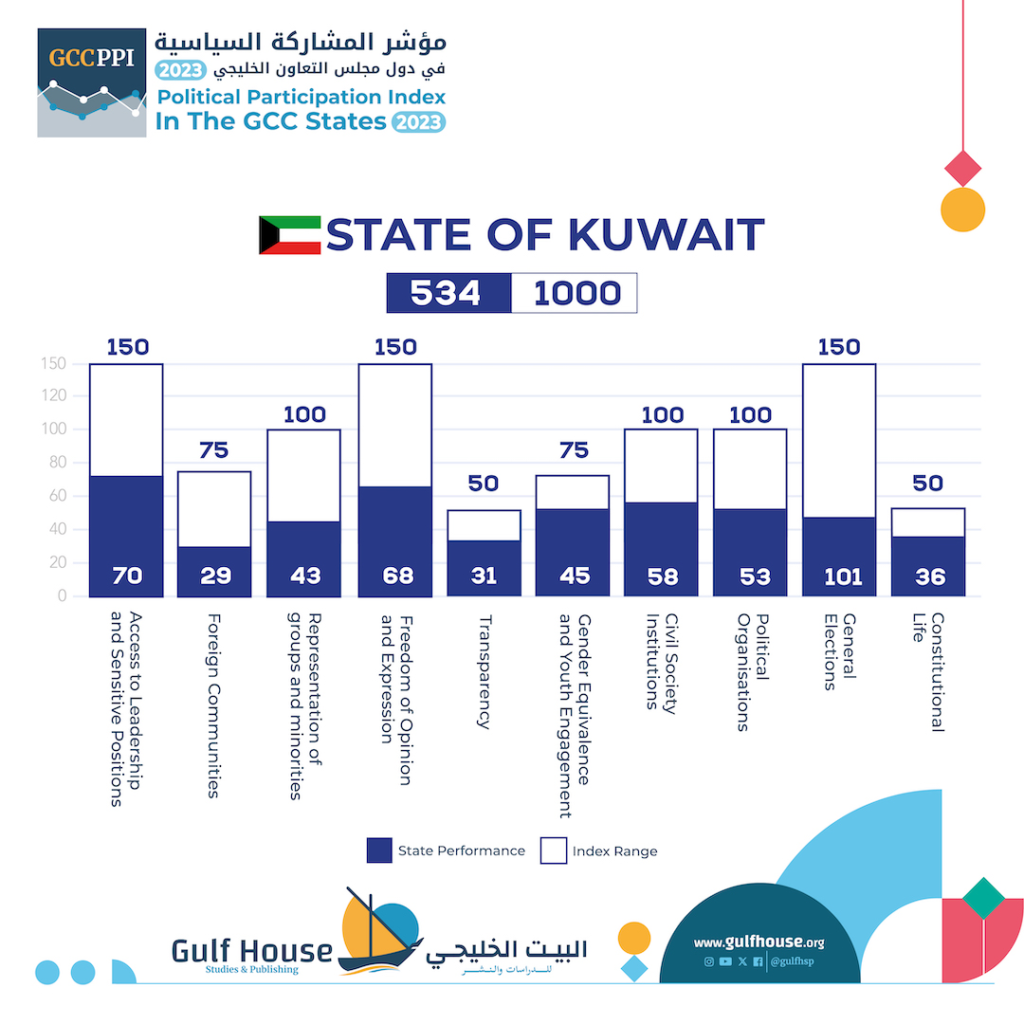
Kuwait ranked top on 5 scales: Constitutional Life, General Elections, Political Organisations, Transparency, and Freedom of Opinion and Expression. Nevertheless, Kuwait ranked low on the Gender Equivalence and Youth Engagement scale, and reported low scores on the Foreign Communities scale, where it ranked low equally with Saudi Arabia.
Significant challenges are noted with regard to the empowerment of Kuwaiti women and their quota in the executive and legislative powers, as well as stability and efficiency of the work of the Legislative Council (National Assembly), the legislation of the work of political parties, the resolution of the Bidoon (stateless) issue, the policies of discrimination among citizens with regard to accessing senior positions and political participation in the elections, and ensuring stable and effective residence of foreign and expatriate workers in the country.
State of Qatar brief results
Qatar has achieved the most noteworthy progress among the GCC countries by advancing (19 scores) on the total index scores, and has maintained second rank recording 472 scores, expanding the difference between it and Oman to 27 scores.
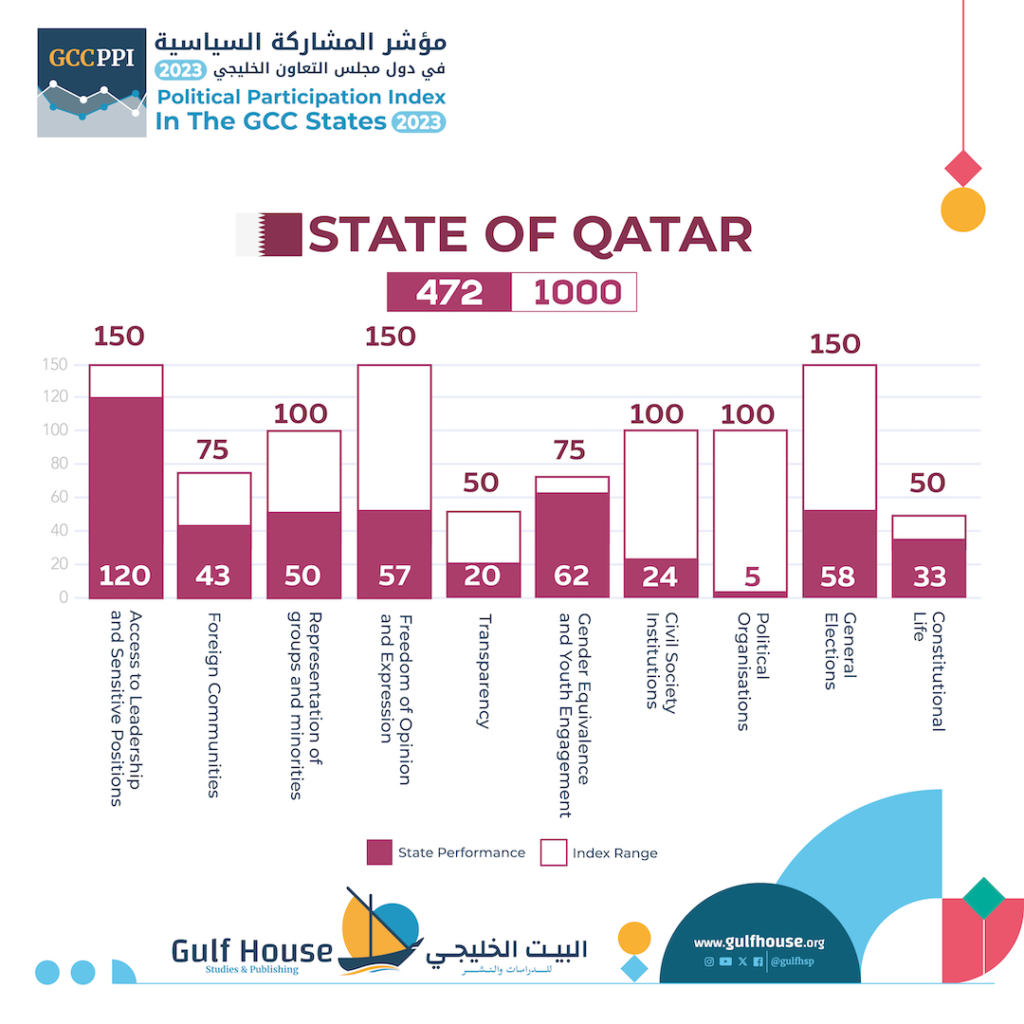
Qatar has maintained its lead of the Arab Gulf countries in the Access to Leadership and Sensitive Positionsscale, and the state performance was promising on the Transparency scale, where it rose by 5 scores, as well as on the Gender Equivalence and Youth Engagement scale by (4 scores).
Qatar has improved on the Freedom of Opinion and Expression scale, where it rose by 5 scores, as well as on the Gender Equivalence and Youth Engagement scale by (4 scores).
Qatar still scores low on Political Organisations scale (5 out of 100) as well as on Civil Society Institutions scale (24 out of 100).
Sultanate of Oman brief results
Oman has ranked third at (445 out of 1,000 scores), ahead of Bahrain by 12 scores.
The Sultanate topped the Representation of Groups and Minorities scale (83 out of 100) for the fourth year in a row, relying on government policies that guarantee equality among its citizens and proportionate representation of the various components of society. Oman ranked second among the GCC countries on the Foreign Communities scale (54 out of 75).
Despite its advance (6 scores) on the index’s total scores this year, the country’s performance is still disappointing on the Political Organisations scale (4 out of 100), the General Elections scale (35 out of 150) and the Transparency scale (12 out of 50).
Kingdom of Bahrain brief results
Bahrain has continued to rank fourth, scoring (433) out of the total index scores.
Bahrain has reported its best progress on the Freedom of Opinion and Expression scale (3 scores), and has also made limited progress on the Gender Equivalence and Youth Engagement scale (2 scores) as well as on the Foreign Communities scale, while the largest decline (5 scores) on the General Elections scale was due to the introduction of new amendments to the internal regulations of the Council of Representatives that reduced the powers of its elected members, in addition to measures that deprived citizens from participating in the parliamentary elections held in the country.
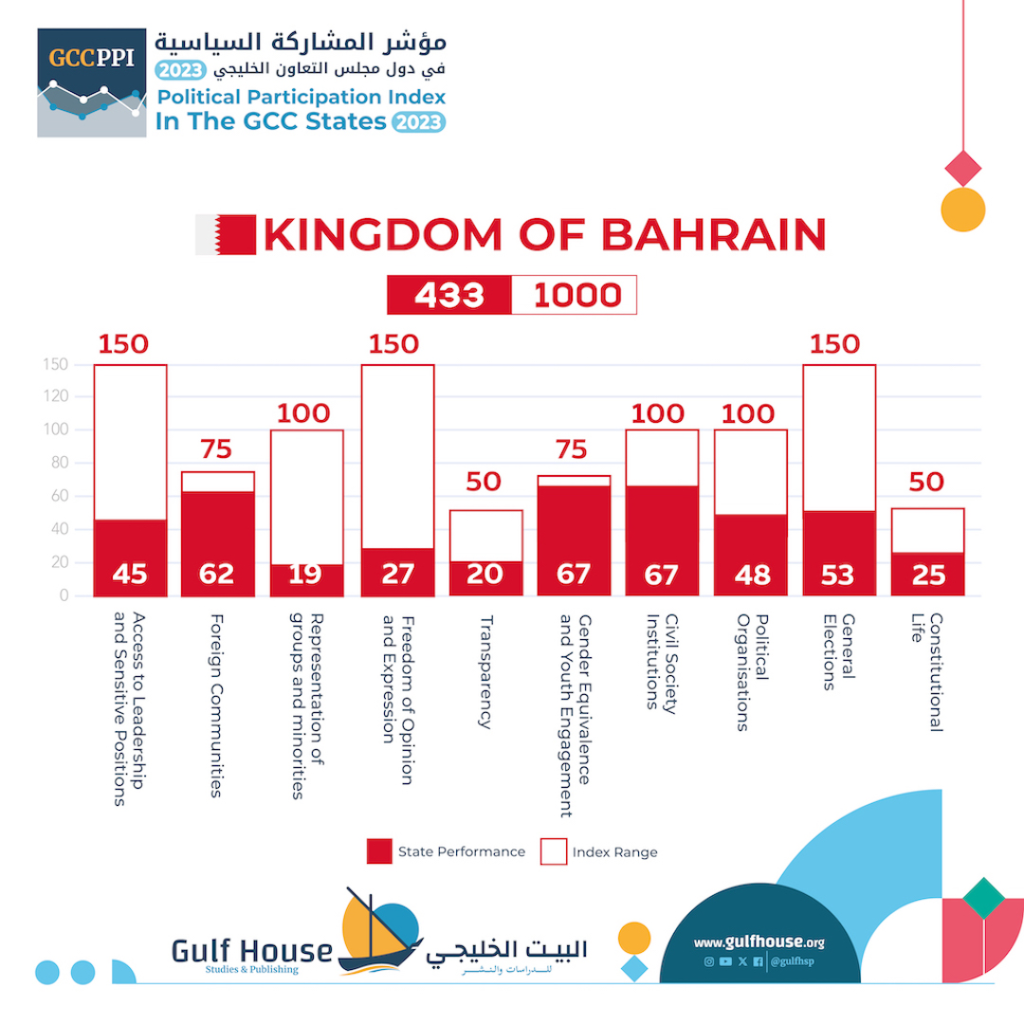
Although Bahrain has also declined by 4 scores on the Civil Society Institutions scale, it has continued to be considered the best performing country among the GCC countries on this scale. It has also maintained its top rank on the Foreign Communities scale (62 out of 75) by ensuring stable and effective residency for foreign communities residing there.
Bahrain has declined (3 degrees) on the Representation of Groups and Minorities scale (19 out of 100 scores), placing it at the bottom of the list of countries on this scale. Bahrain also ranked at the bottom of the Access to Leadership and Sensitive Positions scale (45 out of 150).
The United Arab Emirates brief results
The UAE has ranked fifth among the Arab Gulf countries by 320 scores out of the total index scores. The final tally of the country’s scores did not witness any change.
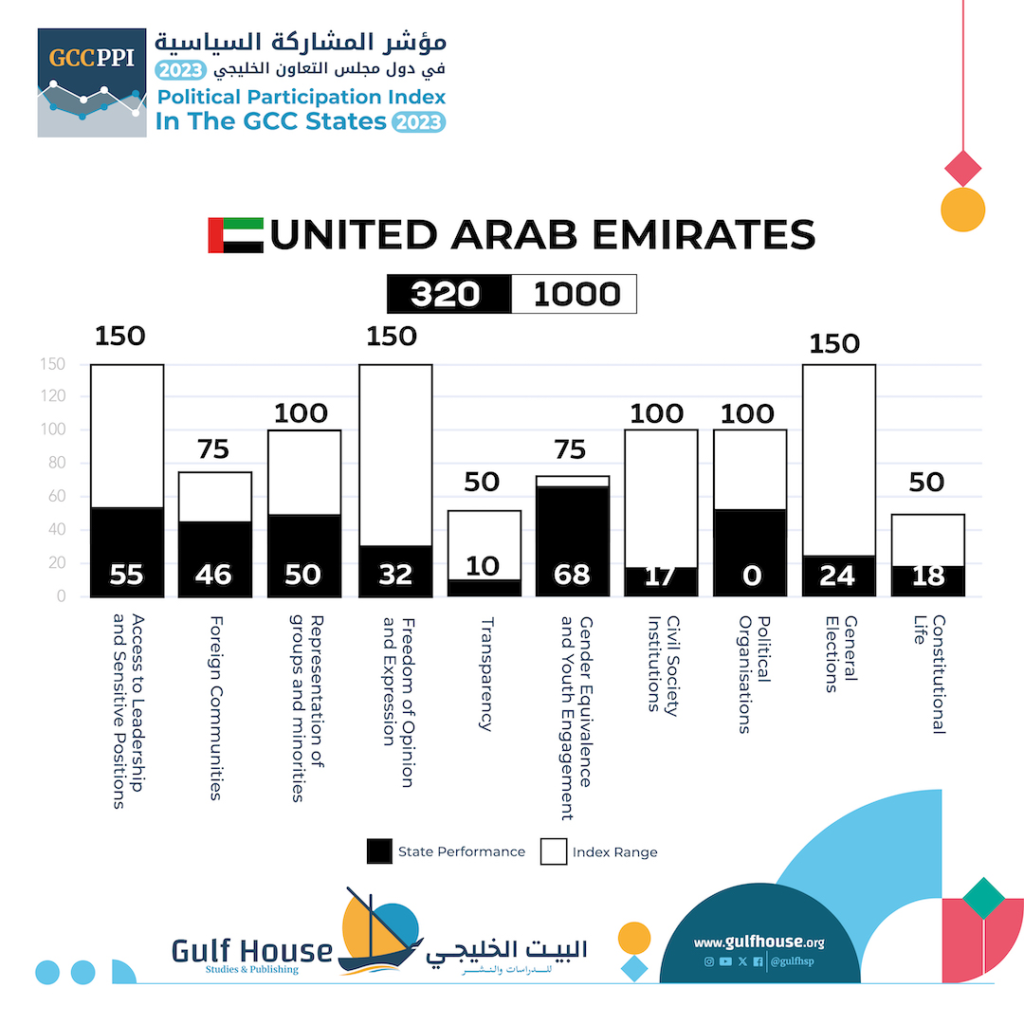
The UAE has maintained the top rank on the Gender Equivalence and Youth Engagement scale (68 out of 75 scores), due to the continuation of government policies and special procedures to ensure a balanced representation of Emirati women and the youth group in various state institutions, as well as on Representation of Groups and Minorities scale (50 out of 100 scores) where it ranked second with Qatar.
The UAE has maintained a “zero” mark on the Political Organisations scale and low results on the General Elections scale. It has also ranked last among Arab Gulf countries on the Civil Society institutions scale (17 out of 100) equally with Saudi Arabia as well as on the Transparency scale (10 out of 50).
Kingdom of Saudi Arabia brief results
Saudi Arabia has continued to progress for the fourth year in a row, as it has achieved 17 additional scores so that its total scores reached 250 out of 1,000. Nevertheless, Saudi Arabia has remained at the bottom of the ranking.
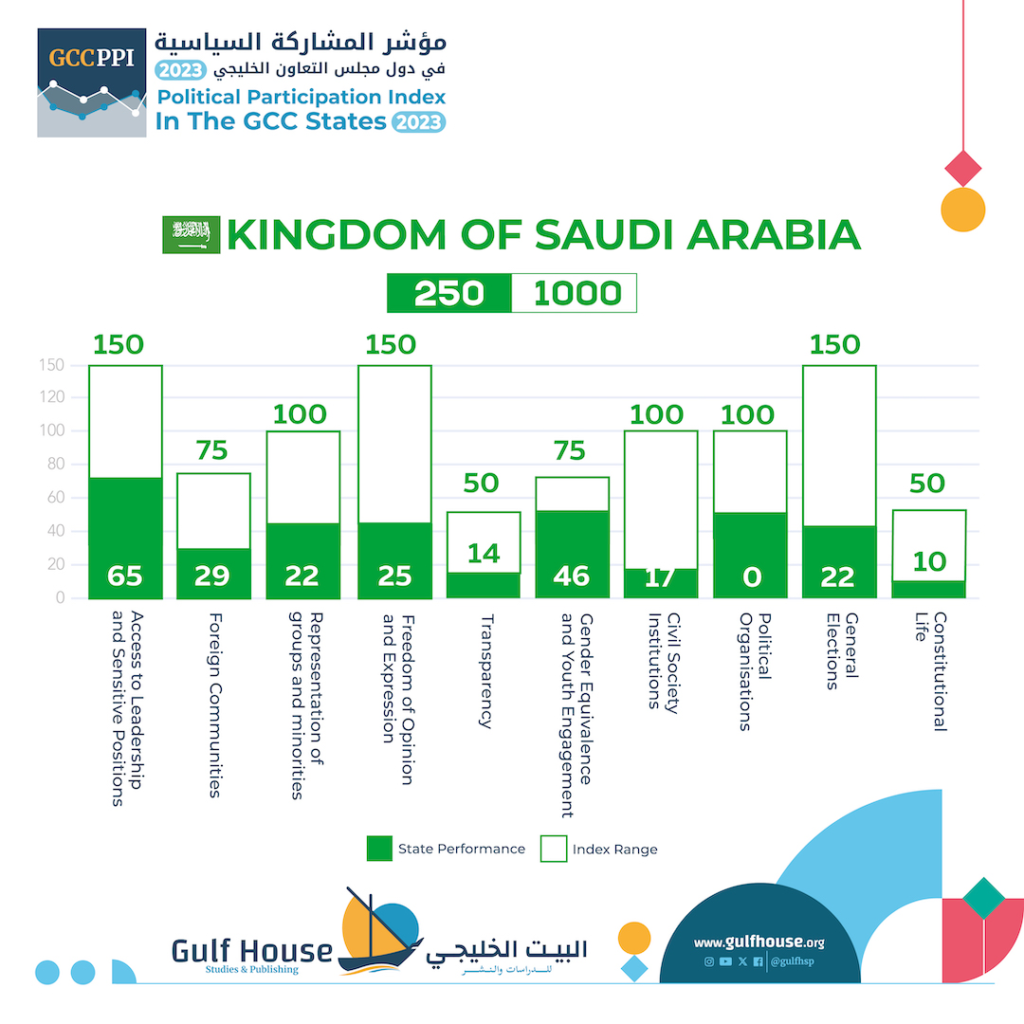
Saudi Arabia has witnessed significant progress on the Gender Equivalence and Youth Engagement scale (8 scores) as a result of the continuation of government policies and initiatives to empower women and the youth at a pace that appears to be the fastest among the GCC countries. Saudi Arabia has witnessed progress on the Transparency scale (3 scores), Foreign Communities scale (3 scores) and the Representation of Groups and Minorities scale (2 scores).
Saudi Arabia has not witnessed any decline on any of the index scales. However, it remained with a “zero” mark on the Political Organisations scale, and reported low scores on the Constitutional Life, General Elections, Civil Society Institutions, Freedom of Opinion and Expression and Foreign Communities scales.
What is the the Political Participation Index?
The PPI is an annual overview and scientific monitoring of the degree of political, social and cultural participation in the six Gulf Cooperation Council countries: Kingdom of Bahrain, Sultanate of Oman, State of Qatar, Kingdom of Saudi Arabia and United Arab Emirates.
This index carries significance for being the first specialised research publication concerned with measuring the degree of “political participation” in the Gulf Cooperation Council countries. The uniqueness of the index is that it combines all conceptual contexts (academic, international agreements and covenants, knowledge and practical experiences), and the specifics, conditions of evolution and structure of governance systems in the Gulf Cooperation Council countries.
The index attempts to answer a major question pertaining to the extent and proportion of the Gulf Cooperation Council countries’ engagement of their citizens politically, and the consequent desire and ability of citizens themselves, individuals and groups, to participate in decision-making and influence the state’s policies, legislation, and in all aspects of political and social life in their states.
Acknowledgement
The Gulf House for Studies and Publishing would like to thank all researchers who contributed to this research, focused workshops, index research and design, and the review and auditing processes. We also thank the sponsor and supporter, National Endowment for Democracy (NED) – the United States.

